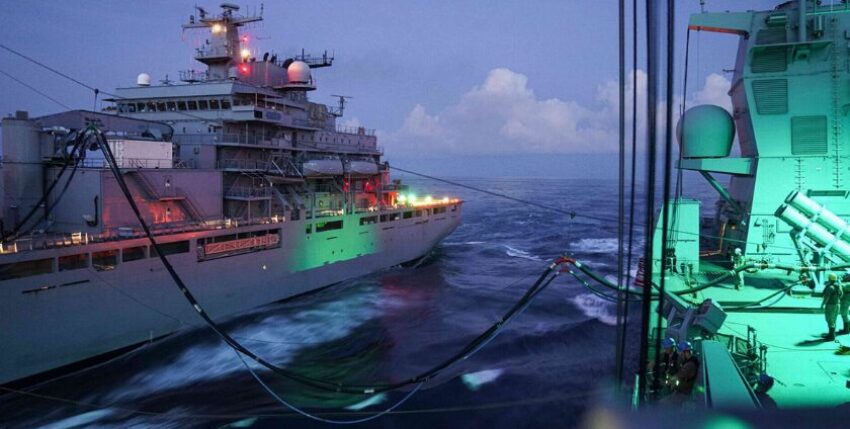Marineforum conducted an interview with Flotilla Admiral Axel Schulz, commander of Flotilla 2, also CTG 500.01 and thus commander of the German Navy's Indo-Pacific task force.
The Navy's IPD24, Pacific Waves 24, has completed its first third. With the start of RIMPAC, the project is entering another, operationally more challenging phase. How do you rate the journey so far?
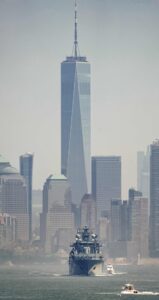
I just say: "Once in a Lifetime"! A great endeavour. And I am proud and happy to be able to lead this association. I would like to avoid stringing together superlatives, but the hospitality in Halifax was outstanding as always, and the opportunity to pass the Statue of Liberty in New York in the US Fleet Week parade line-up is not something you experience every day. The thought of immersing myself in the flood of white uniforms in Times Square and enjoying Fleet Week with the New Yorkers and American naval comrades still gives me goose bumps.
The passage through the Panama Canal was also very impressive - unfortunately with very little daylight.
San Diego was a real working harbour for us, from which we learnt once again that a crew change on a Class 125 frigate is anything but trivial during operations. A real tour de force for the two crews, but in the end they did a great job. So my appreciation to the crews BRAVO and ECHO - BRAVO ZULU!
We are currently berthed at the historic Pearl Harbour naval base. Despite an intensive harbour phase and preparations for the world's largest maritime exercise RIMPAC, we still had some recovery time for the crews and the opportunity to get to know a little bit of paradise - to paraphrase "Magnum".
What has impressed you personally the most so far?
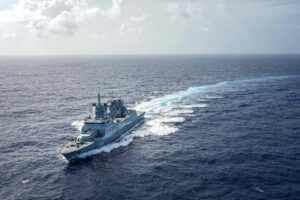
During transit from San Diego to Hawaii, a Mexican marine fell seriously ill and was taken on board the EGV "Frankfurt am Main". Our medical team was able to save the soldier's life with an emergency operation.
The bottom line is that the international cooperation between the friendly navies worked extremely well, even though there had hardly been any points of contact in the past. It only took 90 minutes from the emergency call to the operating table, which is a remarkable achievement. The Marine Emergency Rescue Centre (MERZ) with its professional doctors and medical service personnel once again impressively demonstrated its operational value as a "main weapon system" of the EGV.
And where have you been most challenged as CTG 500.01 so far?
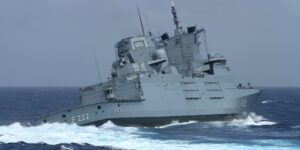
I have a strong team around me, a very good staff, excellent ship's commands and great crews - so the challenges have been manageable so far. But things really get going tomorrow when we set sail for the RIMPAC sea phase. I'm deployed there as commander of an international task group - that will be exciting and certainly challenging. But I also know that I can rely on a strong and well-coordinated team. The harbour phase has also shown that we have common ground not only with our close partners and allies, with whom we exercise on a daily basis, but also with our friendly Pacific navies. Experience has shown that mutual understanding among naval personnel is very high anyway. What's more, we all use very similar procedures. I am therefore convinced that we will have a very successful exercise.
What expectations do you have of RIMPAC? Please tell our readers in a little more detail what the marine participation is like.
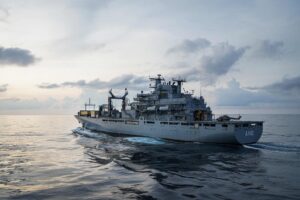
When you stand on the bridge of the "Baden-Württemberg" and look at the many grey ships, you quickly realise the dimensions of this exercise. The silhouette of the aircraft carrier "USS Carl Vinson" characterises the picture, Arleigh Burke destroyers lie in a pack of three, and in addition to the many US stern flags, one discovers quite a few very familiar and other flags from friendly navies.
This year, 29 nations with 40 ships, three submarines, 14 national land forces and over 150 aeroplanes and helicopters will take part in this exercise. Around 25,000 soldiers will be training together. It is the largest naval exercise in the world, and we have the privilege of being part of it.
As already mentioned, the Pacific partners are also real professionals and we all meet as equals.
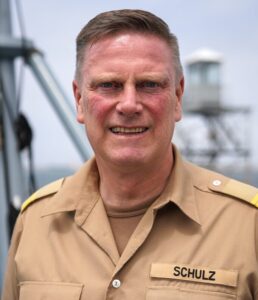
What is your experience of working with our partners? Are there any particular expectations - perhaps especially from the nations in the Indo-Pacific region?
The collaboration with our Pacific partners is uncomplicated and very friendly. I felt very comfortable both in the working meetings and in the personal encounters on board and felt a lot of solidarity. In many conversations, I was asked about our past involvement in the Indo-Pacific. It became clear to me that our activities, starting with the voyage of the frigate "Bayern" three years ago, are very prominently recognised. I was told that continued German involvement would be very welcome.
The interview was conducted by Hans-Uwe Mergener.

